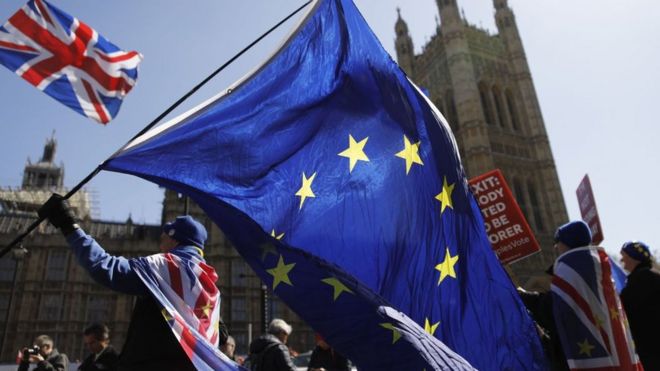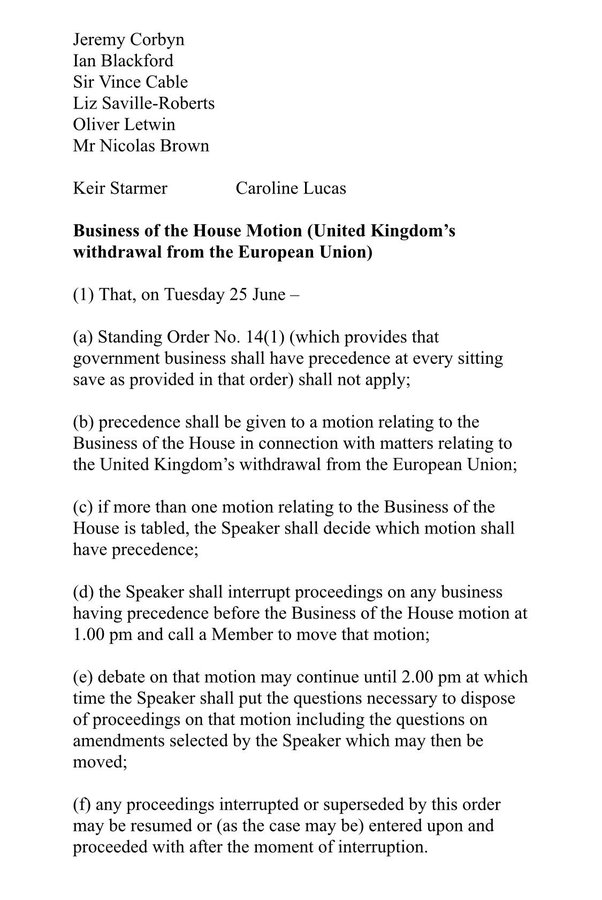 GETTY IMAGES
GETTY IMAGES
The party plans to force a vote on Wednesday which would give MPs control of the timetable on 25 June.
Labour says if the motion passes, MPs will be able to introduce legislation on that day to avoid a no-deal scenario at the end of October.
Some Tory leadership hopefuls have said they would leave the EU without a deal.
Michael Gove said Labour's plans "must be resisted", as while he would prefer to agree a plan with the EU, "we must not rule out no deal".

For other candidates, including Rory Stewart and Mark Harper, the prospect of leaving without a deal is unacceptable.
However, neither man appears prepared to back the opposition motion. Mr Harper said his "instinct" was to oppose it while Mr Stewart - despite saying he was "wholly supportive" of the idea at his campaign launch in London - later tweeted that he would not be voting for it.
Leaving on a no-deal basis - without any agreement on the shape of the future relationship between the UK and EU - could lead to significant disruption.
The EU has previously said border checks would have to be brought in, affecting things like exports and travel and creating uncertainty around the rights of UK citizens living in the EU and vice-versa.
- Can Parliament stop a no-deal Brexit?
- Corbyn in 'heated' meeting with MPs
- Labour still split over further referendum
The government normally controls business in the Commons - but MPs have previously seized control to legislate in favour of extending the Brexit process.
Shadow Brexit minister Jenny Chapman said Wednesday's vote was a "safety valve" aimed at Tory leadership candidates trying to cut MPs out of the decision.
Dominic Raab and Esther McVey have both said they would consider shutting down Parliament early - proroguing - in order to drive through no deal.
Ms Chapman told BBC Radio 4's Today programme the motion provided a mechanism so the next PM could not "lock Parliament out of this process", adding: "They would have to come back to Parliament and get the consent of MPs."
Labour's Brexit spokesman Sir Keir Starmer said MPs "cannot be bystanders" while the next prime minister "tries to crash the UK out of the European Union without a deal and without the consent of the British people".
"That's why we are taking this latest measure to end the uncertainty and protect communities across the country," he said.
Three Tories
The motion has cross-party backing, including from one Tory MP - Sir Oliver Letwin - who is supporting Michael Gove in the leadership contest.
It has been signed by Jeremy Corbyn, SNP Westminster leader Ian Blackford, Lib Dem leader Sir Vince Cable, Change UK leader Anna Soubry, Plaid Cymru Westminster leader Liz Saville-Roberts and former Green Party leader Caroline Lucas.

Due to the confidence and supply agreement with the Democratic Unionist Party, the Tories have a majority in Parliament of five.
That means it would take only three Conservatives to vote with the Labour motion for it to pass - if all opposition party MPs back it.

Analysis: By Jonathan Blake, BBC political correspondent
Another attempt to re-write the rules, another heave in the procedural tug of war, another day of drama in Parliament. But will it work?
It's not a straight vote for or against a no-deal Brexit - that would not change the fact that it is written in law and agreed with the EU that Brexit will happen on 31 October.
Think of this plan not as a knockout blow in a boxing match, but the first of a complicated sequence of moves in a chess game.
Labour want to pull off something similar to what happened in March, when MPs took control of parliamentary time to force the government to request an extension to the Brexit process from the EU.
Step one is seizing control of business in the House of Commons, and that's clearly the plan this time around.
Beyond that, the details aren't clear.
Compelling the new prime minister to ask the EU to delay Brexit further is the most likely option. But the answer of course, might be "no".

Former Tory Attorney General Dominic Grieve signalled his support, telling BBC Radio 4's World Tonight it was the "right course of action" and would "head off a major crisis".
And former Conservative MP Nick Boles, who now sits as an independent, said he would be flying back specially from a foreign trip to back the motion.
But International Trade Secretary Liam Fox told the BBC the move was "typical of the current Labour Party", saying: "Jeremy [Corbyn] wants to be a Remainer in the south and a Leaver in the north."
"If Labour tomorrow wants to make no deal impossible, they are making revocation [of Article 50] and staying in the EU a possibility."
Justice Minister Robert Buckland called it "parliamentary game-playing", asking: "What is the point of all this sound and fury?"

Can Parliament stop a no-deal Brexit?
The default position in law is that the UK will leave the EU on 31 October - and if nothing changes, Brexit will happen regardless of whether there is a deal or not.
MPs wanting to stop a new PM leaving without a deal do however have a number of options at their disposal.
One would be to pass legislation requiring the government to seek an extension to the UK's membership. The EU would have to agree to an extension for it to be granted.
However, this would first require MPs to seize control of the parliamentary agenda, as Labour is attempting.
Another would be to use a vote of no confidence to bring down a government committed to pursuing a no-deal exit.
MPs could also use motions or political pressure to try and force the government into changing course.


What questions do you have about Brexit?
Use this form to ask your question:
https://www.bbc.com/news/uk-politics-48598760



